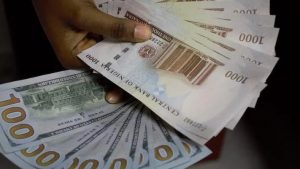FX unification positive step to economic stability, says Deloitte
June 27, 20237.5K views0 comments
By Onome Amuge
The unification of the foreign exchange rate by the Central Bank of Nigeria (CBN) has been described as positive news for Nigerians and investors alike as Africa’s largest economy finally joins the league of countries with a flexible exchange rate, allowing market forces of demand and supply to determine the price of the national currency.
Deloitte, the world’s largest professional services network, commended the move in a June 2023 report titled, “Nigeria joins the league of countries with a flexible currency.”
Following the free floating exchange rate introduced by the Nigerian government, the report said the era of uncertainty can be termed as over for the Nigerian economy as there will be no more use of a blended rate for budget planning or pricing of goods and services.
Read Also:
In its assessment of Nigeria’s old forex regime, the report showed that it was adversely impacted by a combination of a misaligned exchange rate and dollar illiquidity, marked by limited export base,negative investor sentiment, as well as “Speculation, fear and panic buying”.
“Investor sentiment in the Nigerian economy and the policy environment has been dampened over the years and this has affected the flow of FPIs into the country. This can be attributed to factors such as the opaqueness of policy decisions, the use of capital controls, lack of depth of the financial markets, difficulty in exiting the market, etc. It led to the likes of JP Morgan removing Nigeria from its Emerging Market Government Bond Index,” Deloitte stated.
Deloitte explained that while having a fixed exchange rate provides certainty, it is expensive to maintain as a country with a fixed exchange rate will need to have a robust external buffer to support the value of its currency.
On the other hand, the report showed that a free floating exchange rate is determined by market forces of demand and supply,has a lower risk of being overvalued, and is also not expensive to maintain.
Deloitte, which classified the impact of the new policy as “better late than never”, highlighted the economic benefits of the flexible exchange rate to include:
-A more efficient price determining mechanism as market forces of demand and supply will determine prices.
-Unified exchange rate as opposed to multiple exchange rates.
-Competitive rate for banks as they are now enabled to freely trade within the stipulated guidelines of the CBN using the “willing seller and buyer model” with minimal differential in rates. -Removal of artificial demand, speculative buying and arbitrage, meaning that effective demand can be determined and met.
-Increased inflow of foreign portfolio investments (FPIs), thereby boosting the supply of dollars.
-Removal of artificial demand, speculative buying and arbitrage; effective demand can be determined and met
-Removal of subsidy payments on invisible transactions, as such transactions will now be determined at the prevailing market rate.
-Sharp devaluation of the naira.
-Growth in the external reserves level as a result of increased dollar supply and reduced forex demand.
Concerning its impact on fiscal policy, the reports said it will lead to more revenue in naira terms and an increase in the monthly statutory allocation to the three tiers of government.
The report, however, projected that servicing of dollar denominated debt would rise further.
On the necessary monetary measures policy authorities need to take to complement the CBN’s exchange rate management, Deloitte called for the removal of capital controls such as the list of 43 items restricted from accessing forex at the interbank market.
It also advised policy holders to deepen the depth of financial and capital markets to attract more FPIs.
Concerning non-monetary measures, Deloitte advised the government to create an enabling environment and improve the ease of doing business to attract real sector investment.
It also called for deliberate promotion of import substitution industries, massive investment in infrastructure to support an aspirational manufacturing base both for import substitution and export.
The report suggested that the government considers diversification of the export base away from hydrocarbons and increase focus on other exports such as cocoa, sesame seeds, cashew, refined petroleum products, once refining capacity is enhanced.
“However, the issue of competitive advantage needs to be addressed, in order to compete internationally with other countries that are better resourced with respect to capacity, infrastructure and technological knowhow,” the report concluded.

